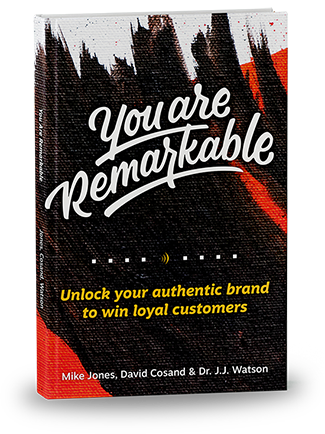Podcast: Play in new window | Download
Subscribe: RSS
We talk a lot about how the world needs brands as they are at Resound. Meaning – a company should be itself – have its own unique and true identity – and not try to be something it is not.
This comes from our fundamental belief that – just as individual human beings are intrinsically remarkable – so are the organizations that human beings come together and create. And if you want to find out more about this belief and how we see it play out in branding and marketing, you’ll definitely want to grab a copy of our upcoming book, You Are Remarkable: How To Unlock Your Authentic Brand To Attract Loyal Customers.
This is all really important because if you’re not working to understand your organization’s unique identity – get to its real essence – you can quickly find yourself branding the wrong way. This can lead to many unintended issues that will hamper your marketing and communications and ultimately your organization’s growth.
Accidental Branding
We like to call this lack of depth in finding an organization’s identity “Accidental Branding.”
Accidental branding happens when you base your brand on something currently useful or interesting, instead of doing the hard work to deeply understand your company’s unique identity. It might reflect some aspects of the company here and now but it doesn’t really get to the heart – or essence – of the brand and will certainly not stand the test of time.
Accidental branding can happen for a variety of reasons – and some of them may even seem excusable. Maybe there’s a rush to get it done to meet some arbitrary deadline, or because those involved in the process have little stake in the outcome, or maybe because no one wants to think super deeply about the organization’s ultimate purpose. No matter the reason, accidental branding will leave your brand without depth or a lasting purpose.
What happens when a company goes for the “quick and easy” solution to branding?
There are four things they’ll mistake for their true identity:
- Goals
- Competition
- Management Structure
- History
Now don’t get me wrong: these things are important to your brand as you craft your brand story. But it is a big mistake to confuse any of these by themselves as the essence of your brand. Why? Because these things are all temporary: they will all change (and quickly!) This will create tension between the new state of the company and your branding. And that means you’re back to rebranding…again. Which leads to confusion with customers, staff, and vendors, and a weakening of your brand’s value.
Two Common Accidental Branding Pitfalls:
Goals
When someone is asked to introduce themselves in front of a group of people, they usually describe themselves based on their current stage of life. They might share where they went to school. They may also share where they currently work, their current role and where they live, whether they have kids (and how many, and what ages), and maybe a few things that they like to do for fun. Introducing themselves in this way allows other people to draw conclusions about their current motives, desires, and goals. We can take an educated guess about how somebody will respond when we know their current situation.
Your current stage of business isn’t who you are.
You know your true motivations, what really drives you, how difficult it is to summarize yourself in a few words. And you also know how your current life circumstances don’t really capture the whole of who you are. Maybe you even resent it a little bit when marketers try to sell to you based on your demographics. Just because you make a lot of money doesn’t mean you like luxury watches. Just because you gave birth to a child doesn’t mean you want “mom” products. You know who you really are.
The same is true of businesses.
When you are introducing your business to a potential client or vendor, you may try to communicate the basics of where you are currently. You might share your location, size, industry, the product or service you’re currently most focused on, your 3-5 year goals, and the strategy you currently have to achieve them. That’s helpful information. But you also know that none of it really gets at who you are as an organization. None of it says why you exist where you are, why you have those goals, or why you’ve adopted that strategy. Your identity as a business isn’t your current size. It is the non-negotiable core that will still be there in the coming years, even if you move locations, grow or shrink in size, and have entirely new goals.
In spite of this, businesses are continually tempted to brand themselves based on “where they are currently.” They develop definitions of who they are in terms of things that will quickly change. Maybe their current desire is to grow into the largest in the state, so they define themselves in terms of growth or size. Their current goal is to double sales to retired persons, so they define themselves in terms of serving retirees. Their current tactic is encouraging referrals, so they define themselves as a referral-based business.
Don’t Be Disappointed with Your Brand.
We all know that when an individual defines themselves in terms of their current goals, the inevitable result is disappointment. If they fail to achieve the goal, they are devastated, because their whole identity is wrapped up in their own failure. They become angry, listless, or disoriented. Yet if they achieve the goal and win the prize, then after a brief euphoria they feel emptiness because there is nothing left for them to do. They become just as disoriented as if they had failed because they wrapped their sense of self up in a temporary goal.
The same is true of a business or organization when it defines itself in terms of a goal. Whether it succeeds or fails at its goal, the organization itself is still going to have to be there the next day. Does meeting or failing at its goal obliterate its identity and sense of purpose? Do its employees end up feeling lost and aimless?
Goals, desires, and tactics all change. Your brand should reflect the aspect of your identity which doesn’t change. This identity can roll with the ups and downs of your organization’s whole lifespan.
Competition
Everybody knows how important it is to differentiate your company from its closest competition. One of the most valuable results of branding is that it immediately differentiates you from the competition. But while your brand should make you stand out, what stands out about you isn’t necessarily your brand.
How you identify somebody is not the same as their identity. If someone was trying to find you at baggage claim in a busy airport, quickly glancing around the crowd, they might look for people of your height, your hair color, the kind of clothing you typically wear, or the way you usually walk. The way somebody quickly differentiates you has to do with how you appear, but little to do with who you are. Someone can make fashion choices to try to outwardly express their identity or to deliberately choose a hairstyle that will make them stand out, but few people are so superficial as to mistake the image they see in the mirror for themselves.
Similarly, while the visual and verbal expression of your brand should quickly differentiate you from your competition – and it should certainly express and reflect your organization’s core identity – the relationship doesn’t hold in reverse.
The way people differentiate you isn’t your brand.
Maybe people recognize you as the “friendly” engineering firm, or as the “smart” realtors, or as the “punctual” accountants. People describe you in this way because they’ve encountered some underlying truth about your identity and what you value. You seem “friendly” because your brand values relationships; or you seem “smart” because your brand values knowledge; you seem “punctual” because your brand values responsibility. Your identity, however, lies in the values, not in the differentiators. Who you are is what differentiates you; your differentiators are not your identity.
Companies that identify themselves with their differentiators inevitably have to rebrand. What differentiates you today won’t make you different tomorrow. You won’t still be the “friendly” engineers when a new competitor arises who beats you in the friendliness category. You can no longer define yourself as the “biggest” or “most award-winning” dealership when another dealership grows larger or wins more awards. If somebody else can copy it or beat you in it, then it’s not your authentic identity.
Often it is when the competition changes and makes the old “differentiator” outdated that an organization has to face itself in the mirror for the first time and consider who it is and why it exists. What is its purpose and what does it value? Those aren’t questions you can answer based on a quick glance around the crowd. You have to look into your organization’s heart and soul.
But Wait, There’s More…Next Time
Okay, those are the first two ways you can get your branding wrong…accidentally. We’ll unpack the other two in a future post. (And if you don’t want to miss it, get signed up to our branding newsletter called Re:Brand.) But I want to leave you with these final thoughts on the ultimate reason so many companies (accidentally) get their branding wrong:
Essence
Ultimately, the mistake of accidental branding comes from confusing what is important with what is essential. Your goals, tactics, leadership, history, and differentiators from the competition are all vitally important components to understand when running a business or developing a marketing plan for it. However, being important doesn’t make them the essence of the business.
The essence of a business is that unchanging core, without which it simply would not be the same business. We believe you can and should find that core. The world truly needs you as you are.
____
Catch part 2 here, and if you’re looking for more brand strategy thinking just like this, consider signing up for our newsletter. Consider joining in on our next Brand Roundtable Chat where we’ll be discussing creating compelling content and building remarkable brands with an intimate group of brand leaders and marketers like yourself.



